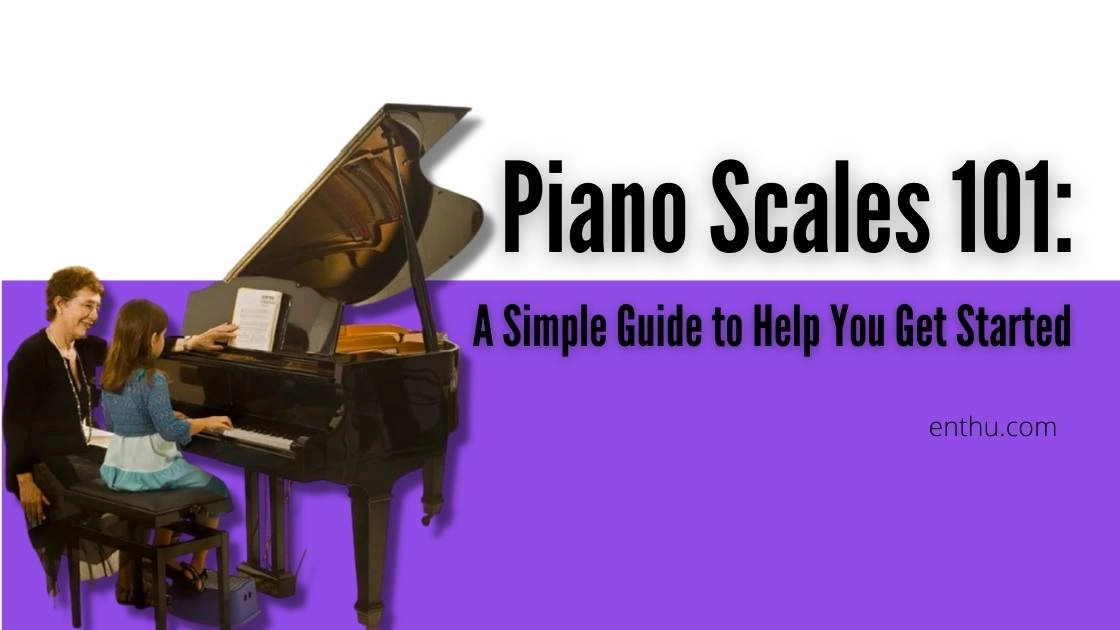Learning piano is a skill, and I would say a skill with minute details, which can result in significant issues if not taken care of. And scales are itself a thing of importance.
Scales are like additives to music, what ingredients are to a recipe. So here are a few things you to keep in mind before and while practicing piano...which will hopefully make your journey smoother and enjoyable.

10 Tips to Practice Piano Scales Effectively
1. Listen to Composers

There is a quote by Richard Branson that says, “Lead by listening– to be a good leader; you have to be a great listener.” The same goes for our aspiring pianists as well.
Whether you are just beginning or have started learning… listening is a great way to create and level up your learning. It gives inspiration and new ideas to your mind.
And if you are not listening in fear of ending up imitating them, then let me clear this out - “you can’t even do it even if you want to!” There’s an individuality in each one’s music that you can’t imitate.
So start listening to recordings of great pianists, take inspiration from them, and learn.
2. Read Well

Now I know playing the piano is a practical thing. But before that, you also need to know some music theory at least, like chord progression, key signature, octaves, etc.

If you have ever heard any classical arrangement and its music sheet, you’ll see that it has every detail written into its grand staff. Everything from major and minor scales, crescendo, descending scale and ascending scale, etc.

You can’t start learning how to use a sword in the field of battle itself. So after listening, analyzing, and reading that piece minutely, refer to it again and again.
This is convenient because most composers use the circle of 5ths to create their compositions.
To those unaware, the circle of fifths is a music theory concept that composers use to organize the 12 chromatic pitches as a sequence of perfect fifths.
For example: if you choose basic C as your starting point, then the sequence would be C major, G major, D major, A major, E major, B major, F sharp, C sharp, A flat, E flat, B flat, F major. You will go back to C as your starting point to continue from F.
You can set your practice routine by adding these in different sequences and on different scales. But note that the basis of all composition is how you set relative minor or major scales.
3. Do Warmup
Finger and Wrist exercises, and maintain Body Posture Now I know there are quite a few folks out there; who will be like - “exercise here”? Then I would say Yes... here’s why….. Many pianists believe the secret to mastering scale is knowing how to move instead of practicing for hours.
Even something as plain as maintaining proper posture can make a difference. Learning techniques and exercises can be tedious, but they are worth the time and effort.

Exercising improves your coordination, muscle memory, dexterity, and finger strength. Not being able to move your hands and fingers properly will undoubtedly result in disconnected notes and broken chords and give a lot of tension to your body.
So next time, never escape your warmup session and finger and wrist exercise before starting.
4. Break it down
This is one of the most fruitful practices you can try for effectively learning piano scales. Our minds perceive things in chunks, small chunks.
So why not feed the mind what it likes the best? Your learning might seem insignificant for a few days, but you will see the results after 1-2 weeks. Never aim to start playing the whole thing at a go. It will only drain you and leave you exhausted.
Instead, break it into chunks. It is suggested to pause after every octave and think about the next step before jumping to the following scale. This is notably effective when you have to practice legato in a melody, be it the left-hand playing chords or the right hand playing the notes.

Also, it is seen that we practice chords we already know. It’s fun actually and gives a feeling of achievement. So what you can do is separate different chunks for different days and stick to it religiously.
In this way, you will also learn difficult scales/chords and be able to practice the ones you like. Kind of a win-win situation, right?
5. Be consistent
As you must have heard, “consistency is the key!”. I think it should be declared a universal key for all problems now. No matter what you are learning, being consistent is very important.
And learning piano is no different in that matter. No matter how many hours you practice but you have to be consistent. And practicing scales can be the best way to start. It will be a perfect exercise for the hands and mind as well.
6. Be slow
It might seem fascinating to hop on keys like a pro, but you need a lot of practice. And you should avoid doing that in the beginning. Starting slow is a great way to get there.
It will give your music accuracy and is an excellent practice for technical skills and hand exercise. Starting and practicing at a slow speed ensures the rhythm is even throughout the entire scale.
Tempo and time are among the most important aspects a pianist needs to master. To start slow is the best practice you can follow to learn piano faster. You can use a metronome for this purpose.
7. Never do the don’ts
There are a few things you should never do. You must try your best to resist them. Apart from our mental memory, we have physical memory as well, and when you practice wrong fingering or wrong notes, it gets into memory, and a habit is formed.
And it gets pretty tricky to undo them! So why not avoid them in starting only. So you need not struggle later, correcting them.
8. Focus on the thumb

Although I’ve mentioned in 3rd point about exercising still thumb asks for extra attention. In hand movements, the smooth movement of the thumb is the most tricky one.
And it is the one that breaks chords if not given attention. So practice thumb exercise and give it a bit more priority because it can bring a massive change in the long run.
9. Try variations As Robert
Hass has said, “Repetition makes us feel secure, and variation makes us free.” It’s our choice what we choose. I would suggest being free.
Don’t just plunge over one thing; instead, try different and new things. Either it’s trying different rhythmic groups or different exercises!
Anything would work as long as you are changing something over some time. This will also ensure constant growth. So do try variations!
10. Be Patient
Last but not least, all these practices like getting good with fingers, managing on the metronome, and coordinating can be overwhelming and might frustrate you a few times.
But you have to be patient here. Take breaks in between, and try different things. Having said to try different things, I will say never leave your problematic areas. And enjoy learning. So try these tips and rock your journey.


Conclusion
So let’s do a quick recap of the tons of things we talked about practicing piano scales. We started by observing and learning from composers; you could also add piano pieces by Chopin and Beethoven to the mix to train your ears to recognize changes in scales.
Then we focus our attention on understanding and reading sheet music - you should learn some music theory for this to work. It would be best to exercise daily to build the required strength and stamina. And learn in chunks, or things will get overwhelming.
Don’t try to rush things; instead, be slow and consistent with your practice. And most importantly, try to experiment with different variations; if you play around with them, you’ll learn faster.
These things will take time, so be patient with yourself. We hope to hear your piano pieces soon; until then, keep playing.
FAQs
1) How do beginners practice piano scales?
The first step for any beginner to learn different scales is mastering one particular octave. Piano teachers start teaching the keyboard or piano with a single scale. You can use a metronome to get used to changing tempo. The essential C with the right hand is probably a good place to start as a beginner.
2) What is the quickest way to memorize piano scales?
To practice scales, your primary weapon has a practical practice session. Perfecting a piano technique takes time, especially when it comes to scale practice.
3) How do you realize when you are ready to play scales piano?
Before getting started with scales, you should have 3 or 4 major and minor keys perfected in your repertoire. That way, you will know how scales are arranged.


Comments